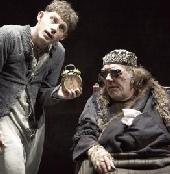SITE GUIDE
SEARCH
REVIEWS
REVIEW ARCHIVES
ADVERTISING AT CURTAINUP
FEATURES
NEWS
Etcetera and
Short Term Listings
LISTINGS
Broadway
Off-Broadway
NYC Restaurants
BOOKS and CDs
OTHER PLACES
Berkshires
London
California
New Jersey
DC
Philadelphia
Elsewhere
QUOTES
TKTS
PLAYWRIGHTS' ALBUMS
LETTERS TO EDITOR
FILM
LINKS
MISCELLANEOUS
Free Updates
Masthead
Writing for Us
A CurtainUp Review
Endgame
|
Nothing is funnier than unhappiness.
--- Nell
|

Lee Evans as Clov and Michael Gambon as Hamm
(Photo: Manuel Harlan) |
Matthew Warchus has cast Lee Evans, heretofore a physical comedian with a silly grin and a simian face, as the slave-servant Clov. This is in keeping with the tradition that saw such as Max Wall, an ex music hall comedian, play Clov. These men, like Buster Keaton, are essentially clowns, masters of the mime, the funny walk and the silently comic message, where all is conveyed by an inspired and idiosyncratic body language. Coupled with the downtrodden, scatty and simple Clov is the gravitas of the foremost heavyweight actor of his generation, Sir Michael Gambon. He with the deep booming voice plays Hamm, a wheel chair bound, blind man who is confined in a strange room with his parents Nell (Liz Smith) and Nagg (Geoffrey Hutchings) who each live under the lid in a detached dustbin.
True to many early audience reactions to the plays of Samuel Beckett, nothing much happens in Endgame, a term for the closing moves in a game of chess or cards. Hamm asks Clov to kill him. Clov doesn't. Hamm asks Clov why he doesn't leave. Clov talks about leaving but he doesn't go. Hamm's parents inhabit their dustbins, popping up surreally to join in the action or rather, inaction.
I found the first fifteen minutes utterly fascinating. Clov, dressed in ragged all-in-one underwear and a threadbare jacket, limps with a curious stilted hop from window to window, carrying a stepladder. The rhythmic repetition of his steps, the way he goes up and down the ladder one foot at a time, like someone with a bad leg, is hypnotic to watch. Often Clov forgets to get the telescope or to move the stepladder and after an expression of exasperation, he has to retread, retrace his steps. It is an involving, comic but it is also very sad image which will stay with me from this production of Endgame. The whole is a metaphor for the repetition and ennui of our existence.
When the great Gambon first opens his mouth, it is to howl, a huge shout of "ME!". His language and indeed his delivery, phrases like "Accursed progenitor", are so theatrical that we wonder if he is a retired thespian. Later, references to a soliloquy and the sub plot confirm the dramatic inference. Wearing on his head the kind of tasselled cap favoured by the intelligensia and round his shoulders the remains of a moth eaten fur collar, and dark glasses he looks like a decrepit artist. His choice of voice too, wavers through several accents so that we are unsure of his origins. While Clov adopts a Southern Irish brogue, Gambon's delivery is much more ambiguous. Whereas Evans can use his body, Gambon is restricted -- no sight of his eyes and no moving out of his chair.
Rob Howell's set, which opens with a very tatty, red velvet curtain with two windows in it, mirrors the internal set consisting of a bare floor-boarded room with two high windows, a door to the side to Clov's kitchen. The old curtains have the feel of a dusty, disused theatre.
The lid flies off and Nagg, Hamm's father, a white faced Geoffrey Hutchings, pops up from his dustbin and looks round, holding onto the dustbin with his scrawny fingers. I thought of Nagg's successor, one of those Muppets that lives in a dustbin, Oscar the Grouch was it? In a tiny part Nagg is joined by his wife Nell, in bonnet and dress but still pasty, pale green like a figure out of a nursery rhyme, grown old.
Endgame may be more fun to reflect on than watching it. There are many questions to be answered. What is Clov's relationship with Hamm? Are they related? But there were also moments when the self indulgence of Beckett's existentialism made me feel I had seen it all before, that Gambon, good as he is, can only confirm the depressing pointlessness and tedium of life. This is not for occasions when you go to the theatre to be taken out of yoursef. However for those who want to see Beckett done well, and as he intended, this is as good a production as existentialists could wish for.
"What's happening?" Hamm calls into space. Indeed . . .
| Endgame
Written by Samuel Beckett Directed by Matthew Warchus Starring: Lee Evans and Michael Gambon With: Liz Smith and Geoffrey Hutchings Designer: Rob Howell Lighting Designer: Mark Henderson Sound: Paul Groothuis Music: Gary Yershon Running time: One hour thirty minutes with no interval Box Office: 0870 060 6621 Booking to 1st May 2004. Reviewed by Lizzie Loveridge based on 10th March 2004 Performance at the Albery Theatre, St Martins Lane, London WC2 (Tube: Leicester Square) |


Mendes at the Donmar
Our Review

Peter Ackroyd's History of London: The Biography

London Sketchbook

Somewhere For Me, a Biography of Richard Rodgers

At This Theater

Ridiculous!The Theatrical Life & Times of Charles Ludlam

The New York Times Book of Broadway: On the Aisle for the Unforgettable Plays of the Last Century

6, 500 Comparative Phrases including 800 Shakespearean Metaphors by CurtainUp's editor.
Click image to buy.
Go here for details and larger image.



